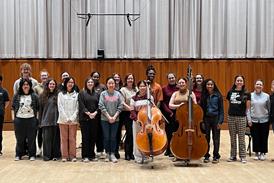Having picked up prizes early in his career, and more recently served as a jury member, the cellist offers some advice for those preparing to join the competition circuit

Competitions can prove to be an important part of preparing for a musical career. They bring out the best in some people and, undoubtedly, they give you a clearer perspective of your current level of playing compared to your peers. A well-organised competition with great media support can also do a lot to promote classical music. All contestants become ‘ambassadors of music’ during and after these occasions, which is an uplifting experience.
Having recently served on the jury of the Tchaikovsky Competition 2019, I had the opportunity to think over some factors that influence the results of a competition and the importance of the preparation process. This is my advice to those considering giving it a go.
- Your ego isn’t as important as the music or your instrument
The musical instrument you play follows the fundamental laws of physics more than your state of mind. It might seem to be obvious, but if you are aware of this fact and think over all its aspects, it may positively influence your focusing and balancing attention.
While preparing for a competition, it is worth looking at the wide range of physical and acoustical tools that can be used for achieving any given musical expression. Working out consciously while developing and making use of these tools, together with gaining a comprehensive understanding of the musical material (including other parts besides your own!) might give you the sense of stability with which you are able to measure if you are ready for the competition or not.
Don’t forget that this sense of stability comes after long-lasting cognitive training, and as a result of hundreds or thousands of hours practice. That is why you should start preparing for the competition long before you submit your application. For your programme, it is worth choosing the pieces of music that you have learnt with this attitude.
- Don’t let your fears hold you back
Firstly, you must define exactly all the things you are afraid of and the purpose of your participation in the chosen competition. If these things are well-defined, hopefully you will understand that there are multiple reasons for taking part in a competition and you will forget about the importance of winning a prize. The preparation process is even more important than the results themselves.
- Visualisations are important
Take steps, even small steps, toward overcoming your fears. Imagine yourself succeeding wonderfully. Visualise feeling great and empowered while playing in a competition in front of the jury and audience, but at the same time feeling calm and focused. Remember every step of your successful preparation process and run through the programme that you will perform, like a Formula 1 driver who learns the ideal curve line on every inch of the racetrack.
- Choose a good mentor and accept the support of your audience
While preparing for a competition you might encounter difficulties. The best advice is for you to find a mentor who can give you not only professional but also emotional help and support. With their help you will be able to monitor your development and understand the importance of the preparation process. You must feel and realise that many people stand behind you while you are on stage playing at a competition. Embrace these positive energies and let them serve as a source of strength and support.
- Never take the results too seriously
No matter if you win or fall out in the first round of the competition, realise that the intense preparation and participation is a useful and important way of getting valuable performance experience under ‘real life’ pressure.
There are many successful musicians who either failed to win any major competition or fell out in the first round when they took part. From the perspective of your long-term development, you can benefit from participating in a competition even if the results are far from your expectations. Thinking of my own experience, these situations actually do more to help you realise what your shortcomings are and how to fix them. In my case these included trying to prove or overdo something; or the fact that I simply didn’t have the right musical knowledge at that time to fully understand what was written in the score; or that I wasn’t able to project well or sufficiently share with the listeners what I thought and felt about the music.
- Make the most of your time at the event
Participation in a competition also gives you the opportunity to meet up with your peers and like-minded musicians. Hopefully many of them will become your friends and you can collaborate or do common projects with them in the future. You can meet and work together during festivals, and you can also find partners for your chamber music projects. A wonderful example of that is the Piatigorsky International Cello Festival in Los Angeles, where so many great cellists and musicians will meet in March of next year. Look up their life and musical career and I’m sure you will see that real musicianship and a successful career is dependent on much more than winning or losing a competition.
István Várdai is participating in the 2020 Piatigorsky International Cello Festival presented by the University of Southern California Thornton School of Music and Los Angeles Philharmonic from 13 to 22 March.































![[3] IMW_ARD_Preisträger_Viola(c)DanielDelang](https://dnan0fzjxntrj.cloudfront.net/Pictures/100x67/7/3/9/31739_3imw_ard_preistrger_violacdanieldelang_111407.jpg)
![[1] Luiz Fernando Venturelli pc © Todd Rosenberg](https://dnan0fzjxntrj.cloudfront.net/Pictures/100x67/3/9/6/31396_1luizfernandoventurellipctoddrosenberg_216891.jpg)
![[4] 20211209_ChristianMcBride_NewJawn_EbruYildiz_72](https://dnan0fzjxntrj.cloudfront.net/Pictures/100x67/0/3/2/31032_420211209_christianmcbride_newjawn_ebruyildiz_72_801260.jpg)









No comments yet